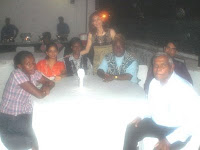
WABA-FIAN Joint Gender Workshop Ends In New Delhi, India
By James Achanyi-Fontem
Cameroon Link
Email: camlink99@gmail.com
Africa was represented at the 5th WABA-FIAN Joint Gender Workshop held in Delhi, India from the 6th to 9th July 2009 by Cameroon, Uganda and Zimbabwe. James Achanyi-Fontem from Cameroon, Grace Mukasa from Uganda and Monica Muti from Zimbabwe, who are already involved in the promotion of infant and young child feeding in their respective countries were sponsored by IBFAN Africa and WABA.
Speaking during the international workshop, the principal trainer, Renu Khana, invited the participants’ to be diligent because the workshop did not going to get into the intricacies of gender and theory due to the short duration for the transfer of knowledge. To compensate the lapses, the resource persons put all the different tools for gender promotion at the disposal of the participants. Renu Khana added that 30% of the course was dedicated to getting participants know themselves because it is vital for planting the seeds of gender.
The participants exploited the application of gender in all aspects of their work and what gender meant for the breastfeeding movement as initiated and promoted by WABA. Working with men was introduced as a special aspect with relevance to gender and breastfeeding promotion to facilitate the expansion of WABA Men’s Initiative in all regions.
Renu Khanna, Paul Sinnappan and Flavio Valente led the participants to focus on gender in the larger context that takes into consideration the situation of the environment, cultures, political and socio-economic reflections within the communities. To achieve this, gender analysis was treated in line with the right to food and gender mainstreaming. Participants were guided on how to apply the ideas during counseling and exchanges as they conceived action plans for their different target groups and regions doable from 2010.
Two strategic plans of action were conceived that cover activities in the areas of gender and breastfeeding, gender and the rights to food. To better understand the issue of gender, Renu Khanna talked about what it is and what it is not. This was better understood when the attitudes of the male and the female were surveyed in groups and discussed in plenary putting in consideration gender natural and structural build ups.
The training was delivered by two experts in gender promotion strategies from India and Malaysia, Renu Khanna and Paul Sinnappan with the coordination of leader-icons from two international networks, Sarah Amin, Co-Director of WABA and Flavio Valente, Secretary General of FIAN.
The joint WABA-FIAN training workshop enabled the 30 breastfeeding and food rights advocates from the networks to raise awareness and sensitivity on gender issues back in their respective regions and countries. Participants were invited to include gender on their work agendas by duplicating sensitization talks and conducting exchange sessions focused on gender challenges to breastfeeding and food rights issues.
The World Alliance for Breastfeeding Action, WABA and the Food First Information and Action Network, FIAN, were assured during the evaluation session that the concept of gender and gender mainstreaming, tools and skills of gender analysis of the course are understood. The development of gender analysis of breastfeeding and rights to adequate food after the training in the respective regions and countries now should now become a reality.
Participants returned with resource materials for the application of gender concepts and the development of gender sensitive strategies and work plans. Within the context of the training, participants learnt about how to differentiate between sex and gender, recall dimensions of gender as a system, enumerate and list gender aspects of breastfeeding and rights to adequate food. The men and women were able to list men’s role and responsibilities in appropriate infant feeding and promotion of rights to adequate food before separating from New Delhi, India last July 10.
The workshop agenda covered issues related to gender and sex, gender as a system, gender aspects of breastfeeding and rights to adequate food, gender analysis frameworks, economic and political contexts of women, men’s involvement, role and responsibilities, gender mainstreaming and gender indicators. The participatory training methodologies included exercises, games, group discussions and presentations, role plays, experience sharing by participants and others.

No comments:
Post a Comment